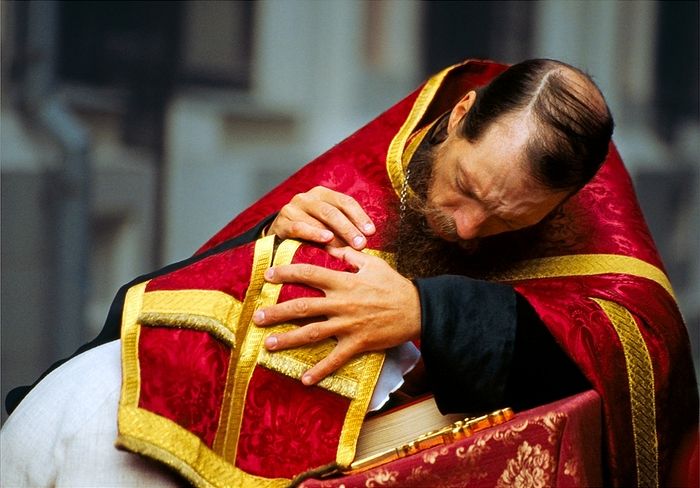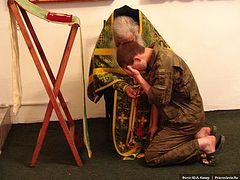Repentance is all-powerful, as instituted by the all-powerful God. There is no sin that can withstand the face of repentance. It is a gift given to fallen human nature; it is what is left of our primordial immaculate state as the awareness of this immaculate state and our grief over its loss; it is the call of Baptism; it is the connection between earth and heaven, the ladder to heaven. By it is every sin cleansed and made straight. If you are burdened by even the most onerous sins, make no hesitation to come to repentance. The measureless ocean swallows equally both the waters of the wide river that flows grandly through many countries, and the modest, barely noticeable streams; so in the bottomless abyss of God’s goodness do serious falls into sin disappear together with the tiny, most insignificant sins. Let the five hundred and the fifty pence assure you of this equal forgiveness—the lender is infinitely rich, and the debtors are all insolvent (cf. Lk. 7:41, 42). And even a small sin remains unremitted if the sinner has neglected to repent of it as insignificant in his view; and a great sin is remitted completely by means of repentance through the boundless goodness and omnipotence of God. Remember St. David, who fell into adultery and murder. Carelessness crept imperceptibly into the soul of this righteous man; from carelessness was born neglect to guard the bodily feelings; his gaze freed from its guard met unexpectedly with the object of temptation; the object of temptation aroused in his sanctified soul an unlawful desire; after the desire followed the lawless fulfillment of it; after the adultery followed vainglorious shame. The shame out of which his human pride was embarrassed of the sin gave birth to a new criminal desire—the desire to hide the sin, to uphold the mask of righteousness before other people. For this the sin of murder was committed. Long did David remain in his hard-heartedness, his insensitivity, as if he were not guilty of any sort of sin. He needed a rebuke from God Himself. At God’s command the prophet Nathan rebuked the sinner—and no sooner than David had said, “I have sinned before the Lord,” than the answer came down from the Lord: The Lord has taken away your sin (2 Kings 12:13).
All-powerful repentance saved whole cities and kingdoms, and revoked sentences already pronounced by God. Thus the populous city of Nineveh, condemned by God’s prophet to destruction, averted it with its sincere repentance—and in vain did the prophet wait outside Nineveh for its devastation, the fulfillment of his own prophecy! The impious King of Israel Ahab, the worshipper of idols, the persecutor and murderer of those who worshipped the true God, had his punishment was already appointed and announced by the great Elias; but Ahab became contrite and shed tears—while abiding in his impiety, by the way. This short-lived contrition, these tiny tears had their effect: Hast thou seen how Ahab has been pricked to the heart before me? The Lord said to Elias. I will not bring on the evil in his days, but in his son’s days will I bring on the evil (3 Kings 22:29). All Holy Scripture, all of Church history is filled with numberless examples that prove the mighty power of repentance.
A certain robber, relates Palladius in the Lausac History, was caught red-handed in a crime and brought to Arsenait, a city in the Thebaid. After many tortures he was sentenced to be beheaded. When he went with the soldiers outside the city to the place of his crime, about six fields out of town, a certain monk followed him, wishing to see his execution. When he saw the monk following behind, the robber said to him, “Abba! Don’t you have any handiwork to do in your cell?” The monk answered, “I do.” The robber said, “Then why aren’t you sitting in your cell and weeping over your sins?” The monk replied, “Brother! I am very lazy; my soul has no contrition, and that is why I have come to watch how you die. Perhaps this spectacle will help me come to contrition.” Then the robber said, “Abba! Go sit in your cell for God’s sake, and bless and glorify the Savior Christ. From the time He became incarnate and died for us sinners, man no longer dies.”
Here is another just as touching and edifying story. “Near a certain city there lived a recluse who had the gift of clairvoyance from God. In that city there was a famous harlot. One day the recluse saw a bright trail leading from the women’s monastery near the city unto heaven, and a soul was walking along it with great joy, led by angels, and nearing the heavenly gates. He sent his disciple to the convent to learn who had died there. When the disciple returned he brought the news that no one had died in the convent, but that a famous harlot who had come from the city had died suddenly before the gates of the monastery. Completely perplexed, the recluse began praying to God that He would explain this vision to him. God answered the holy elder, “Surely did you see the soul of a woman, a former harlot, ascending to heaven. She had resolved firmly to repent and change her life, and she had come to the convent with the resolute intention of staying in it. That she died before the gates of the convent without having been able yet to fulfill her intention was according to God’s plan. But God accepted her intention as if she had actually fulfilled it.”
In these two stories we can see experientially the fulfillment of the Gospel promise. And the Gospel itself gives us so many such examples!...





